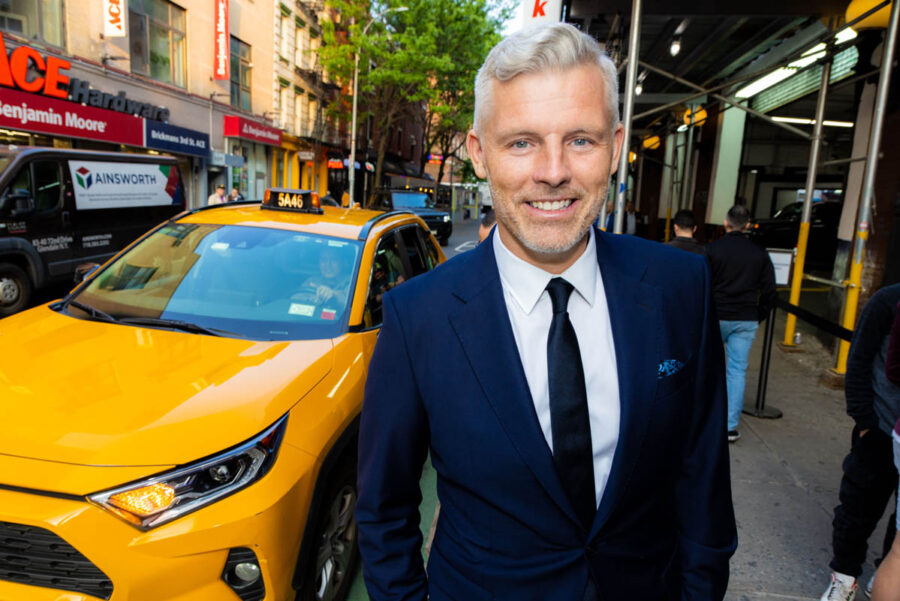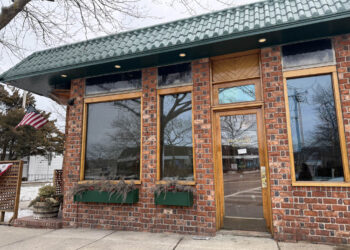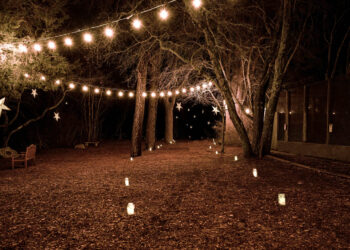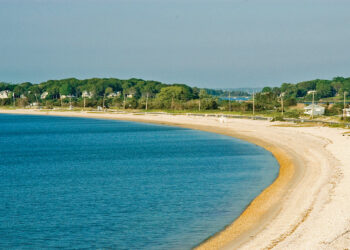
Comedian Des Bishop took the stage at Westhampton Beach Performing Arts Center this week and delivered laugh after laugh. A native New Yorker, Des moved to Ireland in his teenage years, which ultimately inspired his start in comedy and a successful career that has spanned three decades.
His comedy is full of observational humor and nostalgia, whether it be about his many cross-cultural experiences, an ever-changing societal landscape, and his own personal stories growing up. Des brings energy and a unique perspective to every show, evident at his Westhampton show, the place he has spent all his summers since the 90s.
Des spoke more about his background, how his experiences have shaped his approach to comedy, his connection with the East End, and his WHBPAC show.
Can you tell us a bit about your background and how you first got into comedy?
DB: Well, my background is a little complicated, but the quick version is I grew up in Queens, flunked out of St. Francis Prep at 14, and ended up going to Ireland to boarding school in 1990. It was a crazy, life-changing experience, but it definitely saved my education and ultimately inspired a comedy career that in the early days focused a lot on being an outsider looking in. It’s hard to know if I ever would have tried stand-up if I hadn’t been in Ireland. I got sober at 19 and it was a comedian I knew from that world that pushed me to try stand up. Once I got on stage that was all she wrote. I was addicted.
What were some of the biggest challenges you faced early in your career, and how did you overcome them?
DB: I had a lot of early challenges but probably the biggest one was getting testicular cancer when I was 24. I mean career wise it didn’t change much other than a few cancelations and postponements, but it definitely gives you a fright and makes you think about what life is all about. I got some good jokes out of it, which I still tell to this day. I wrote them originally as a coping mechanism, but I like telling them still because it reminds men to check themselves and, God forbid someone should find a lump, it lets them know there is nothing to fear. The fear stopped me from taking action for months and that can be deadly, so I try to stop people from procrastinating like I did.
For those who may be new to your work, how would you describe your comedic style?
DB: These days I would say my comic style is still aggressively observational, but it’s hard not to lean on nostalgia as I head toward my 50th birthday. Also, I spent most of my career in Ireland so now that I am back living in NY full time it has been fun to flip the outsider point of view I had in Ireland and throw that glance on the U.S. Plus, I get to explore the nostalgia of my childhood in a way I couldn’t in Ireland because those references wouldn’t have resonated with them.
Who were your biggest influences or inspirations when you were starting out—and have they changed over time?
DB: When I first became aware of stand-up, it was because of the popularity of Eddie Murphy. I can’t deny that he was my first inspiration. My friends and I watched Delirious and Raw on repeat and would recite the jokes to anyone who would listen. When I started stand-up, I was really into Bill Hicks, George Carlin, and Chris Rock. Irish comics that people over here wouldn’t be as familiar with like Dylan Moran and Tommy Tiernan also inspired me in my early career. Now I just enjoy good bits when I see them. Social media is a blessing and a curse in our world, but one of the great things is the broad amount of people you get to see that I would have never been exposed to in the past.
What kinds of topics or themes do you enjoy exploring most in your sets?
DB: As I said already, I am very into nostalgia at the moment because it’s fun to look back. Until recently I was probably in denial about how old I am and how things that I still consider recent are already 20 years ago. Since society has changed so rapidly it’s fun to joke about the differences and try to make some deeper points about what might not be working out so well for us as a result of those changes. And I’m fine with becoming a “back in my day” storyteller because the jokes are there. I am also having fun with the cultural difference of growing up in the melting pot of Queens in the 80s. I was never able to chat about that in Ireland because they just don’t get that world.
Do you have any pre-show rituals you stick to before going on stage?
DB: I really don’t. I am not a great eater pre-show, and my rider is only red bull and bananas. I try to avoid the red bull early in the week but as the shows go from night to night and the fatigue kicks in, I hit em! My act is pretty energetic, so I need to make sure I have it in the tank.
What does “success” mean to you as a comedian—and has that definition evolved over the years?
DB: Well, the bottom line for me is getting people to come to my shows. I have had a long and successful career in Ireland where I made TV shows and wrote a book and all that but at the heart of it was the desire to be popular and well known enough to get people into rooms to watch me perform. That is what I love doing. I am most happy on stage with a great atmosphere, making people laugh. I have loved all the other projects I have done over the years, but my heart is on stage.
How has comedy allowed you to express yourself or process life in ways other forms of communication haven’t?
DB: That’s a hard question because sometimes I feel that humor can be used to avoid facing things in their entirety. I say that more about emotional truths for myself. A few therapists have called me out for making a joke at a particularly difficult moment in a conversation with them. Where I think comedy is great is being able to talk about difficult things on stage that help people to digest what would otherwise be too intense or sad. For example, I did a one-man show about my mother dying, which was a great way to explore grief and my relationship with my mother. I think it’s a rewarding experience for the audience to find laughter in that without shirking from the reality of the pain of it. But back to what I started saying at the beginning of this answer, a few therapists would probably ask what compelled me to deal with that by joking about it on stage!
Tell us about your WHBPAC show?
DB: It’s a fun show that I have been performing for a while, so they got the tried and tested tail end of my latest tour around the states. As I said, it’s quite nostalgic and the good news is that I get quite nostalgic about my NY childhood, which I find resonated really well on Long Island.
What are you most excited about when it comes to performing on the East End?
DB: We are late in the chat to reveal that I have spent my summers in Westhampton since 1990. Despite all those years in Ireland, I always came back here during the summer so it’s nice to be able to chat about that on stage, and also for all the people I have known for so long to be able to come to my show. I can literally walk to the WHBPAC from my house so everything about performing there is amazing.
Do you have any favorite East End spots, routines, or memories you’d like to share?
DB: I mean I have so many. But since the show is in Westhampton I might as well say that I have a warped nostalgia for the days in the “washed out section” of what is now Westhampton Dunes. As a fearless teenager I loved exploring abandoned houses that would soon be swept away into the ocean. I was aware of the tragedy of it all, of course, but that was nature’s fault, not mine, and as a young man it was quite an experience being down there at that time before, eventually, we couldn’t even get down there after the Nor’easter caused the breach. We had a small but amazing community back then, bouncing down the sand in 4-wheel drives getting to our houses, and it was really fun for me and my brothers.
How much does the local environment or audience influence your material?
DB: In this case, probably a lot because I am so familiar with the area. Plus, who doesn’t want to make fun of some of the unique Hamptons nonsense that only locals and frequent visitors will get.
In what ways have your cross-cultural experiences shaped how you see the world—and how you translate that into comedy?
DB: Well, for those that don’t know I also do comedy in Mandarin and lived in Beijing for two years. I think the ability to do something like that stems from whatever survival skills I learned when I had to fit in with a new culture in Ireland at 14. I think humor was one of the ways I fit in, and it became a useful skill for the rest of my life. I really enjoy an outsider’s perspective on things I am too familiar with, so I assume people in different cultures have enjoyed mine. The rewarding challenge for me over the years has been to try and find something universal in the fish-out-of-water experiences that make the stories interesting to anyone who hears them, not just the people that are familiar with that culture. Not all the stories translate, but it’s very satisfying when they do. I think the China stories in particular have had great success everywhere because of people’s fascination with China and the language being so interesting.












